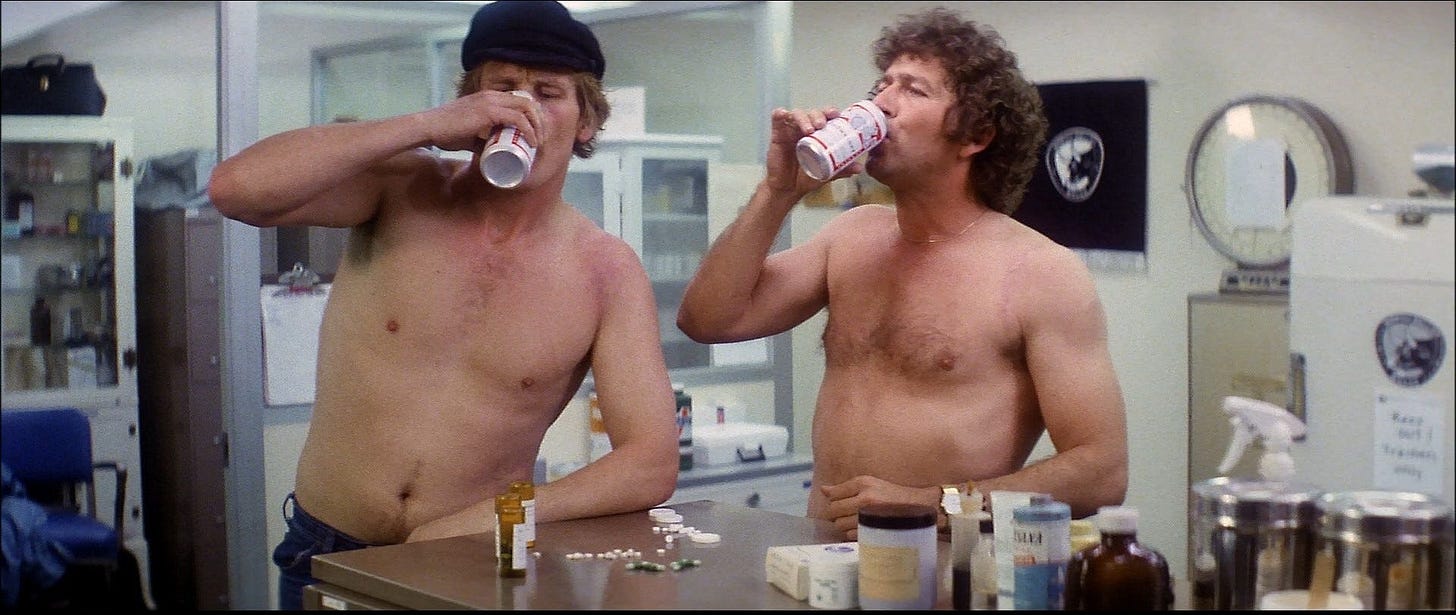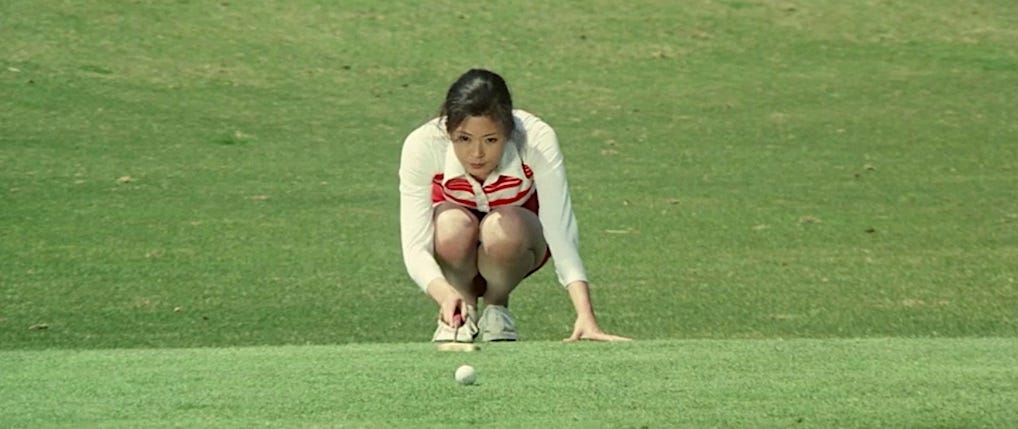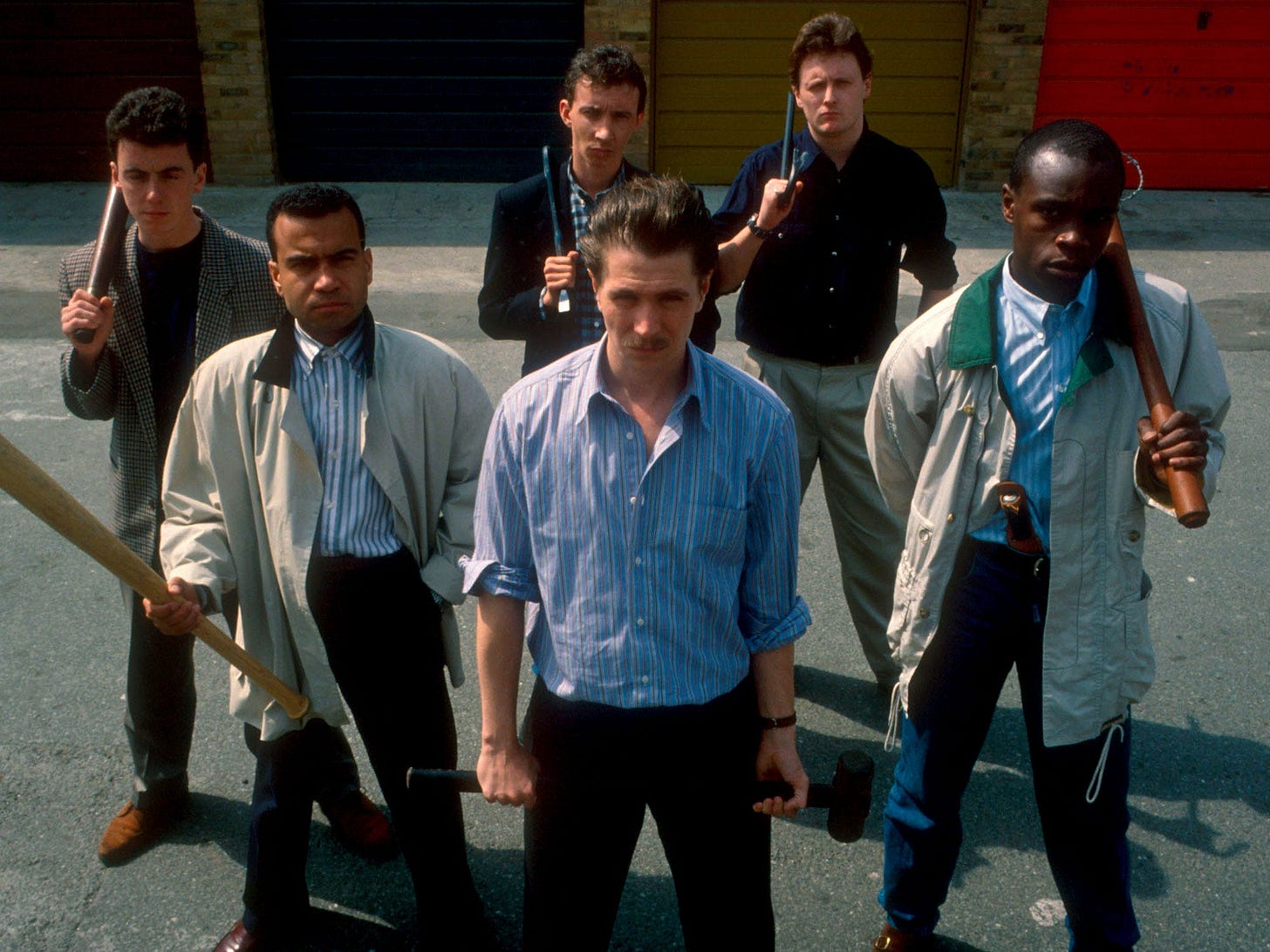And the winner of game three of the 1990s film playoffs is Richard Linklater’s Before Sunrise, by an astounding 86 percent. No love for Romance? Just know that Catherine Breillat is out there somewhere exhaling Gitanes smoke and sighing, “Non, je ne regrette rien.”
Next week it’s Gregg Araki’s Doom Generation versus David Lynch’s Lost Highway. But since we’re putting films through athletic paces, we decided to share some of our favorites that are actually about sports.
Sports have been part of cinema since the days of Muybridge’s motion studies. They’ve also been politicized entertainment since the start of the modern Olympics, up to the rightward shift of the Rocky series. After all, the idea of what is “inspiring” is both easy and changeable. The best sports films resist those manipulative narratives by focusing instead on individual athletes and their struggles against the limits of their bodies, minds, and their industry.
Personal Best (1982)
Look, if the writer of Chinatown is going to write and direct a lesbian track-and-field romance film, you’re going to get the Chinatown of lesbian track-and-field romance films.
Is Robert Towne’s movie also a studio artifact from just before the era of new queer cinema? Yes, but the writing is so painfully real as Mariel Hemingway and runner-turned-actor Patrice Donnelly train for the doomed 1980 Olympics, fall in love along the way, best each other, break up, and fall into mutual respect after collectively missing their Olympic moment. Bonus: the film’s sweat-core fashion inspired a queer punk classic. (Streaming on Prime)
North Dallas Forty (1979)
All you need to know is the NFL fired or blacklisted any player or employee who was involved in the making of this movie full of sociopathic coaches, sponsor party orgies, and drug addicts pushed beyond broken. Nick Nolte is a dharma bum on the gridiron near the end of his career as a wide receiver, still bristling against the conformity that the NFL demands. There’s an opening act that probably inspired the opening act of Anchorman but its humor and passion for the game still lands. What makes North Dallas Forty truly different is how director Ted Kotcheff centers pain as the organizing principle of these players’ lives. Pain is ecstasy, fear, and ultimately fate, and all this is achieved by bravely holding the camera on faces and scarred bodies. There are monologues about dildos and codeine, to be sure, but Kotcheff never stops framing the players with the reverence of Joan of Arc. Emily worked with the late Kotcheff on his memoir and you can read her post about that time. (Available from Imprint)
A Story of Sorrow and Sadness (1977)
No one could mess up a movie with as much artistry and weirdness as Seijun Suzuki could. In 1967 he was assigned by his studio to direct a standard Yakuza hitman movie, Branded to Kill. Bored with the script, he turned the film into a crazed, pop art masterpiece that bent the cliches of genre with surreal logic. He was fired from that studio, but after 10 years of exile he went back to work at the same studio to make a sports melodrama about a manufactured golf superstar. He promptly turned it into a crazed, pop art masterpiece that bent the cliches of genre with surreal logic.
At first we think the story of golf pro Reiko being manipulated by cynical marketing executives is going to be a breezy Albert Brooks–like satire. But after her star rises, a neighbor becomes obsessed with her and systematically inserts herself into Reiko’s life, ultimately destroying it. The demented energy is ratcheted up in every scene and if Darren Aronofsky didn’t see this before making Mother! I’d be surprised. (Available from Radiance Films)
The Firm (1989)
Alan Clarke’s final film, The Firm, is a sustained 90-minute heart attack of class resentment and knife violence. Gary Oldman plays Bex, a football hooligan and real estate agent navigating his double life in yuppie-ascendent Britain. In Clarke’s Elephant—his most known film—he used the poetry of the Steadicam to implicate the viewer in a relentless murder tour of Belfast during the Troubles. In The Firm he uses it to sync our pulse rates with Bex as he sprints from failed rumbles with other aging football gangs, to a final breakdown with his wife, played by Oldman’s then real-life partner Lesley Manville. Not much of it is about the game itself, and that’s the point.
We covered The Firm during the last World Cup and paired it with The Damned United. While the underrated film The Damned United is worth a watch for Michael Sheen’s brilliant performance, it’s The Firm that will take you into the heart of toxic fandom like nothing else. (Only available on DVD!)
Challengers (2024)
Confession. Emily and I never thought we’d swoon over a Luca Guadagnino movie. Not after his 2009 film I Am Love left us rolling on the floor in hysterics. (About now is the time to look back and admit y’all took molecular gastronomy way too seriously.)
But Challengers’ pro-level time jumping to capture a three-way relationship between a tennis contender, a could’ve been, and someone who’s still trying results in some of the best filmmaking of the decade. Challengers doesn’t reinvent the sports film—plot-wise it borrows equally from Personal Best and North Dallas Forty. However, Justin Kuritzkes’ script does reinvent the idea of the sport muse. You could spend most of the movie thinking the competition between Art and Patrick is over Zendaya’s Tashi. But by the end you realize it is for her approval. (Available on Prime)









